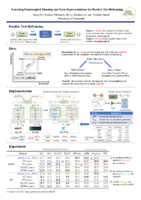Learning Disentangled Meaning and Style Representations for Positive Text Reframing
Xu Sheng, Fumiyo Fukumoto, Jiyi Li, Go Kentaro, Yoshimi Suzuki
Abstract:
The positive text reframing (PTR) task which generates a text giving a positive perspective with preserving the sense of the input text, has attracted considerable attention as one of the NLP applications. Due to the significant representation capability of the pre-trained language model (PLM), a beneficial baseline can be easily obtained by just fine-tuning the PLM. However, how to interpret a diversity of contexts to give a positive perspective is still an open problem. Especially, it is more serious when the size of the training data is limited. In this paper, we present a PTR framework, that learns representations where the meaning and style of text are structurally disentangled. The method utilizes pseudo-positive reframing datasets which are generated with two augmentation strategies. A simple but effective multi-task learning-based model is learned to fuse the generation capabilities from these datasets. Experimental results on Positive Psychology Frames (PPF) dataset, show that our approach outperforms the baselines, BART by five and T5 by six evaluation metrics. Our source codes and data are available online.
